|
|
Campaigning to stop female genital
cutting in Kenya. 2008 -2011 3-year project
Thanks to the generous donations from:
- the International Solidarity Service (SSI - Service de la Solidarité
Internationale), State of Geneva, Suisse
- the Town of Geneva, and town councils of Carouge, Chêne-Bourg,
Thônex, Cologny
- private donors sensitive to preserving women's integrity (and
therefore stopping FGM)
MAA was able to launch a vast campaign in Kenya to eradicate this
harmful practice amongst the most concerned populations: the Massai,
the Kissii, the Samburu, the Borana and the Somali (immigrant) communities.

Alternative ceremony for over 50 girls,
Inkati village, Mile Tisa, Kajiado, Kenya.
How MAA and its collaborators
helped save over 700 girls from genital cutting during December
2009 in Kenya
We knew that in Kenya December would
be the month during which the most ritual cuttings of girls were
most likely to take place. Not only is it the summer holidays and
school is over, but it also rains again, which means green grass
and enough food: cows are producing milk again and this abundance
makes people want to celebrate and go on with their life projects…but
not always with the good ones!
Many fathers are thinking about their daughters' future: ‹‹Will
she pass into the following grade next year? Or would it be better,
as she is just becoming a teenager, to prepare her for marriage?
››. This preparation consists in being cut in order to
be "marriageable" in the following 2 to 3 months. And
of course, any interrogation about future education for the young
girl is then eluded. Very often these girls are only 10 to 14 years
old at the most. During December, their life is going to take an
important turn, introducing them to unbelievable violence that calls
itself "traditional": in fact, it's nothing more than
a mutilation, followed by rape set up by her own family and supported
by a community stuck in superstitions and a lack of knowledge.
All of this isn't very much in accordance with the "Children
Rights", that the governments have ratified and talk about
repeatedly, nor with the Right to Education for each and every child.
Moreover, all of it doesn't preserve and respect women's dignity
and integrity.
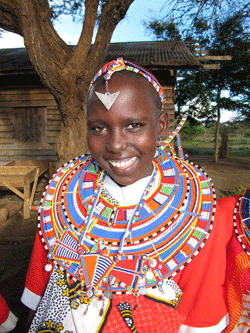
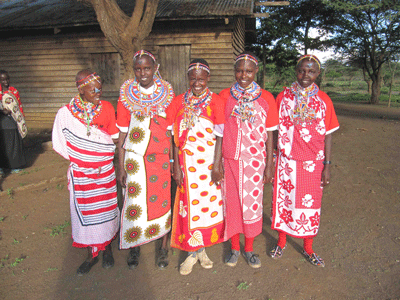
Massai girls dressed up for the alternative ceremony
that will preserve them from being cut - Olgira village, Rombo,
Kenya.
Thanks to donations from the State of Geneva's International Solidarity
Service (SSI - Service de la Solidarité Internationale),
town councils and private donors, MAA was able to launch the project
"for a progressive eradication of FGM (Female Genital Mutilation)
in Kenya, 2008-2011".
During 2009, we organised over 40 seminars and workshops in villages,
schools, churches and mosques around the country. In November-December
2009, this campaign was highlighted with several "alternative
ceremonies" that took place instead of the traditional massive
cutting rituals. In Kenya, it's therefore called ARP (alternative
rite of passage): it is held in villages and all the inhabitants,
parents, school authorities, police representatives and health authorities
are invited. The 50 to 70 young girls that "should be cut"
are encouraged to sing and dance in front of the whole village audience.
The day before, a workshop is held for them in order to give them
the necessary tools to understand that saying "NO to genital
cutting" is the right choice. The day of the celebration, the
parents and the whole village listen to speeches about FGM from
MAA collaborators, the chief of the police, the school director,
a representative of the medical staff, the religious leader, etc.
Every one explains why this harmful tradition must stop, why girls
must be allowed to pursue their education and not be married off
prematurely, why the community must evolve dynamically and why some
practices must be changed so all human rights are respected. These
messages are mostly well heard by the population. When a small resistance
appears, it is quickly swept away by one of our collaborators, always
very motivated to make their point against FGM, using one of the
many explanations we know of. Also, individual accounts of mothers
and children contribute to reinforce our alternative ceremonies
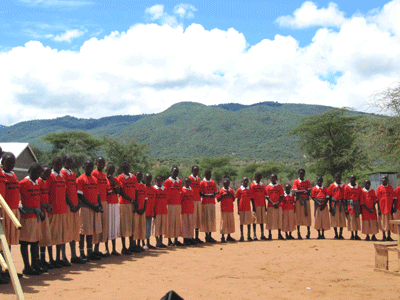
Inkati village - Celebration of
an alternative ceremony- December 2009
This year, over 700 young girls in Kenya took part in MAA's "alternative
rite".
Here are the numbers:
Kajiado district, Loitokitok
o Matepes village, 50 girls from 8 to 16 years old, and over 200
parents.
o Elerai village, 45 girls from 6 to 16 years old, and over 300
parents.
o Olgira village, 50 girls from 7 to 19 years old, over 250 parents.
o Olmapinu village, 55 girls from 7 to 18 years old, over 300 parents.
o 3-day seminar given for 25 women who perform FGM in the region.
Their followed a course about birth assisting (to help with straightforward
deliveries) and received a first aid kit and a delivery kit.

Oletukat village - Narok North,
girls wearing the gift T-shirt for the ceremony, it reads:
"FREE FROM FGM" on the front and "GIVE ME A CHANCE"
on the back.
Kajiado district, Mille Tisa
o Noontoto village, 50 girls from 6 to 16 years old, local authorities
and parents.
o Engamboli (Mille Tisa) village, girls from 6 to 16 years old,
local authorities and parents.
o Inkati village, 50 girls from 6 to 16 years old, local authorities
and parents.

The school director giving out a
certificate to every girl who "graduated" into adulthood
without being cut. Engamboli village, Mile Tisa.
Narok North district
o Oletukat village, 56 girls from 6 to 18 years old and over 150
parents. Also children from the villages of Osero,Olkutoto, Lemek,
Olopayia, Sipitali.
o Ilntumtum village, 64 girls; participation of children from the
neighbouring villages Emurua Dikir et Maisiodo, Olbilai, Enkoireroi,Ongata
Naado, Enaramatishoreki, Nkama et Kaila.
o Narok town, workshop for the town's Imams, the madrasa teachers
and the Oulemas; 25 adults participants. Annie Corsini visited the
town's main Imam as he was ill and therefore absent from the workshop.
Le directeur de l'école distribue un certificat à
chaque fille qui a "gradué" vers l'âge adulter
sans passer par l'excision.

Traditional dances for the alternative
ceremony, Oletukat.
Narok South district
o Ololulunga village, "Vision Academy " primary school,
65 girls; participation of children from Nkareta village.
o Melelo village, 90 girls with their parents, all from the neighbouring
region.
o Workshop with 40 mothers from Ololunga area who had never before
heard about the dangerous effects of genital cutting.

Parents' reunion before the ceremony. Ilntumtum
village, Narok North.
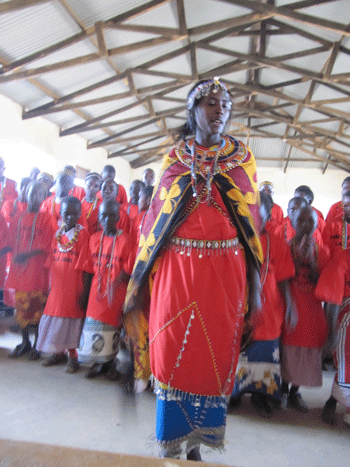
Non-cut girls dance to celebrate
their passage into adulthood in front of the whole village.
Kisii district, Goucha
o Nyankeyio village, 65 girls from 6 to 16 years old and the whole
village.
o Village Kenoria village, 60 girls from 6 to 16 years old with
their parents.
In Kisii, the Health Minister representatives, that is the Public
Health Officer and the Reproductive health Officer from Kisii Provincial
Hospital, wanted to attend the alternative ceremonies.
In Loitokitok, the Hospital authorities said they were interested
in the event, but didn't come all the way out to the faraway villages
where we were working.
In Narok, the medical authorities showed some hostility because
of a small disagreement on one point (we want the Traditional Birth
Attendants who perform FGM to pursue a training course and learn
why they must stop carrying out this operation, whereas the Minister
representative has decided to completely ignore them and exclude
them of any programme). He therefore didn't want to help us.
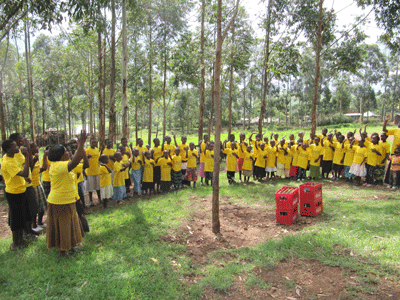
Ceremony in Kissii, Niankeyo village.
After the ceremonies, the parents' commentaries were very positive.
"It was the most beautiful celebration that has ever taken
place in the village!" they said. All of them were very impressed
by the festive atmosphere, the organisation and the size of the
ceremonies. All promised to not have their daughters cut, to let
them carry on school and to protect them from forced early marriages.
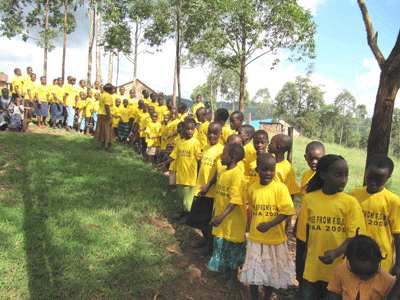
Niankeyo, over 60 girls are celebrating not undergoing FGM!
Current activites :
During December 2009 and January 2010, we planned reconversion workshops
for the Traditional Birth Attendants (TBAs) from other areas:
- 20 TBAs in Narok North,
- 20 TBAs in Kisii, Nyankeyio
- 20 TBAs in Mile Tisa, Namanga
By sharing advice with them about assisting birth, without going
to the hospital but with less risks (elementary hygiene, sterilised
and free instruments), we valorise them and give them the opportunity
to stay legal. If cutting a girl leads to a prison sentence, helping
a mother give birth at the village, when the birth presents no complication,
is absolutely not forbidden and still widely practised. At the end
of the 3-day seminar (of which one is totally devoted to convince
them to stop performing FGM), we sign a namely contract with each
and every one of them. They sign with their fingerprint to vow that
they are going to stop this harmful practice in exchange of the
sanitary material that they receive after the training seminar.
The delivery kit consists of cotton, disinfectant, sterilised razor
blades to cut the umbilical cord, and string. If they see the least
sign of complications when assisting birth, the TBAs know they should
take the mother to be and child to the closest hospital. MAA takes
on the transport fees in case of emergency and encourages them to
go to the hospital as fast as possible

Traditional Birth Attendants during their reconversion seminar.
Rombo- Dispensary training. December 2009
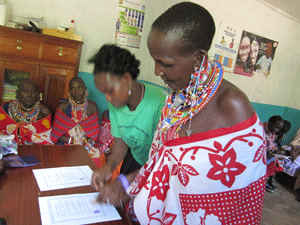
By apposing her fingerprint on a contract with MAA, in front of
a local police officer, this TBA, like 20 others, commits herself
to stop practising FGM. In exchange, she received a midwife training
and medical instruments. Rombo dispensary, December 2009
Our weak points :
- Our campaign could start as planned this year in Isiolo district,
nor in Samburu district. We have to be very attentive to this Muslim
populated area very concerned by FGM. If our investors make it possible
for us to continue our campaign in 2010-2011, a few of MAA collaborators
will need to go to the area for at least two weeks with a precise
and well thought plan of action, in order to initiate several simultaneous
actions there.
- Transmara district is very affected by FGM and is sadly out of
our campaigning zone. In December 2009, 60 girls underwent FGM secretly
and massively (all of them in during on single night). Next year,
we will carry out an information campaign over the whole year, and
in December 2010 we will be there, ready and particularly vigilant.
Any FGM ceremony must be stopped in time with the help of the local
police and authorities, and replaced by an alternative ceremony
(the first of which will be organised by MAA). Transmara's Massais
have the reputation of being fierce and isolated, but MAA has already
become established in other problematic areas. If our donors'' support
is sufficient in 2010, we will prevent the traditional slaughter
that is FGM in that area next year, as it is foreseeable and avoidable.
The worst enemy of human kind is still ignorance!
|
|
|













